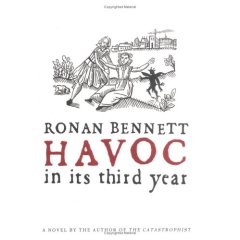WOW, RAIN AND STRONG WINDS, ITS NO WEATHER TO BE OUT IN...but I can't wait to be all cosy in bed while its a howling gale outside.
READING:
In Havoc in its third year the author Ronan Bennet has chosen an historical setting to address a range of moral issues. Set in England, in an un-named town and county, but I suspect it is somewhere like Yorkshire. The year is 1630, Charles I is ruling without Parliament and sectarian discontent is building towards the Civil War. John Brigge,the central character, is a recusant, living in an increasingly fanatically protestant society. He is a landowning farmer who also holds the role of local coroner. A young itinerant woman is accused of infanticide, the locals are sure she is guilty, but his investigation of the case uncovers the growing tensions within the local co
 mmunity. Their leaders capitalise on the fear of crime, fear of immigrants and of those practicing other faiths. All are used by the powers-that-be as reason for ever more restrictive legislation, with harsh punishments for supposed transgressors. The rising paranoia has allowed old rights and entitlements to be leached away thereby placing more and more power in the hands of the governors. The leader of the governors holds the title of Master, and is a man who came as a young idealistic lawyer to challenge and remove the previous corrupt regime (supporters of the previous regime wear a blue ribbon in their hats!). As time has passed the Master has become more and more draconian in his attitudes until there is little difference between his governance and that of the regime he ousted, and anyone who even questions him on any decision is considered an enemy and in the wrong.
mmunity. Their leaders capitalise on the fear of crime, fear of immigrants and of those practicing other faiths. All are used by the powers-that-be as reason for ever more restrictive legislation, with harsh punishments for supposed transgressors. The rising paranoia has allowed old rights and entitlements to be leached away thereby placing more and more power in the hands of the governors. The leader of the governors holds the title of Master, and is a man who came as a young idealistic lawyer to challenge and remove the previous corrupt regime (supporters of the previous regime wear a blue ribbon in their hats!). As time has passed the Master has become more and more draconian in his attitudes until there is little difference between his governance and that of the regime he ousted, and anyone who even questions him on any decision is considered an enemy and in the wrong. Set against this sombre canvas is the detail of Brigge's personal life, and his attempts, as a decent man, to hold true to his beliefs.
It is no easy task for an author who has chosen to write of a particular period in history to find the right style. Modern English would seem too lax but to write it in imagined historic speech can seem arch and I loathe it when a book is written in a style I call "forsoothly". Bennett has managed to find a spareness of language that fits the time perfectly. The book has echoes of Millar's play "The Crucible", with Brigge as John Proctor trying to find a path through the treacherous quicksands of fanaticsm. I think this is an outstanding novel, Bennett has written an extraordinary allegory for our times, and even the most politically disinterested reader cannot fail to grasp the illusions Bennett has drawn between those times and Britain today.
RANTING:
I wish some advertising guru could explain to me the point of putting all the slippery paper inserts into newspapers and magazines - don't they know there is a collective noun for this stuff it is 'Junk Mail' with the emphasis on Junk. Who reads it? do you? - no, I didn't think you did, you probably do what I do, chuck it straight into the recycling bin. Honestly, do these morons think we are all so devoid of excitement in our lives that we go "oh goody, another fascinating offer from Exwhyzed Life Insurance with a free digital alarm clock if we sign up" or "wow, fifty varieties of commonly available garden bedding plants on offer even though its mid-winter I better have some of those" Obviously the newspapers and magazines get money for allowing these insertions so they like having them, but I think the average reader is pissed off with all this crap having to be disposed of. Then of course there is all the junk mail that comes with our post - I shan't go into that, as some seriously experienced ranters have already torched that whole issue, suffice to say you can get that stopped . In this part of north London we are also plagued with letterbox leafleting from various local pizza places. Luridly coloured pizzas which cost less than the paper the leaflet is printed on are offered with a free bottle of some fizzy drink or other as an inducement. Every day we get one or two of these flyers through the door, it drives me mad. And then there are the leaflets from Saga....car insurance, holidays, household insurance you name it, offered to the "over fifties" (code for geriatrics). I may be une femme d'un certain age but I am not yet in my dotage, and resent all this - in the words of Catherine Tate "how very dare they!"
RECIPE:
Tomorrow is what is known as Stir-Up Sunday, the last Sunday before Advent in the Anglican church calendar. The term comes from the opening words of the collect for the day as set out in the Book of Common Prayer 1549:
- It is customary for the preparations for Christmas to begin on Stir-Up Sunday, in particular the making of the Christmas puddings, which require that all the household should stir the mixture. However,because my family are all over the place, I prepared my puddings a fortnight ago when I knew they would all be coming home for Sunday lunch. I have made this recipe many times over the years since I was married, it is a recipe that has been handed down in my maternal family since 1838 when my Great-great-great Grandmother, Elisabeth Middleton worked as cook/housekeeper to the Duke of Northumberland. In 168 years,it has been made in India, in Canada, in Scotland, Zambia and South Africa, and now I make it in London. My daughter will be the seventh generation when she starts using the recipe in years to come. The one thing to remember about this recipe is that it makes 3 puddings - one to be used this year, and two to keep for following years. The pudding keeps brilliantly in a cool dark place.
CHRISTMAS PUDDING
340g fresh white breadcrumbs
250g plain flour
500g of each of the following:
Currants/Raisins/Sultanas/ Citrus Peel/ Brown Sugar/Suet
Juice of two oranges
Rind of two lemons
90g ground almonds
15g chopped nuts
1 nutmeg, completely ground
1 teaspn ground cinnamon
½ teaspn ground ginger
½ teaspn ground allspice
2 good pinches salt
8 eggs
1 wineglass brandy
A little milk
Clean all the dried fruit. Place in a large bowl, pour the brandy over it and leave overnight to soak.
Next day, mix together in a new bowl – Flour/breadcrumbs/ground almonds/nuts/suet/ sugar/spices/ orange juice/ lemon rind.
Beat the eggs and add to the mixture. Mix the fruit into the flour mixture. Stir well – EVERYBODY MAKE A WISH !!
Place in well-buttered pudding bowls, cover with a double sheet of well-buttered greaseproof paper with a central pleat in it. Then cover this with a double layer of pleated aluminium foil. Tie down firmly.
Boil for 6 (six) hours, taking care that the water doesn’t boil dry.
When the puddings are cool, remove the foil and greasproof paper, replace them with a fresh double layer of greaseproof and a square of pudding cloth ( I use old pillowcases). Tie down firmly.
The puddings can now be stored to mature, they keep well for up to 2 years in a cool dry place.
On Christmas day boil or steam the pudding for 2 hours - once again, make sure the water does not boil dry -easily done in the excitement of Christmas day! Turn out onto a heated serving dish and pour flaming brandy over, top with caster sugar and a sprig of holly.
Serve with Brandy Butter.


No comments:
Post a Comment